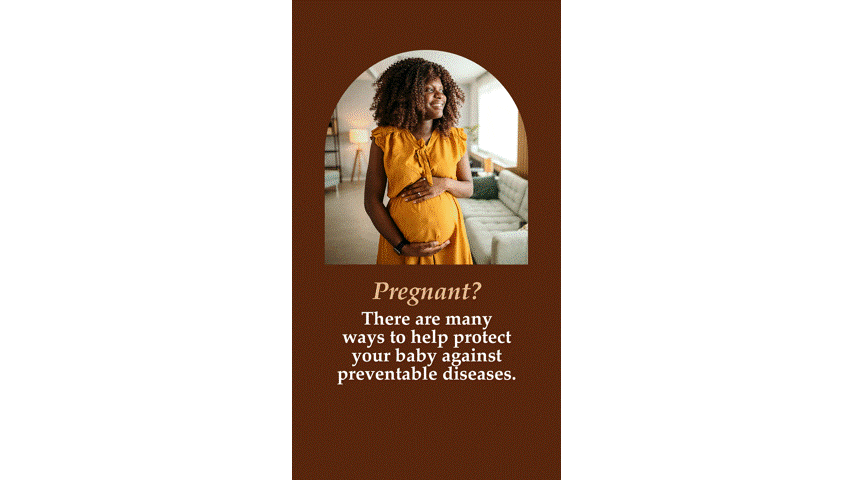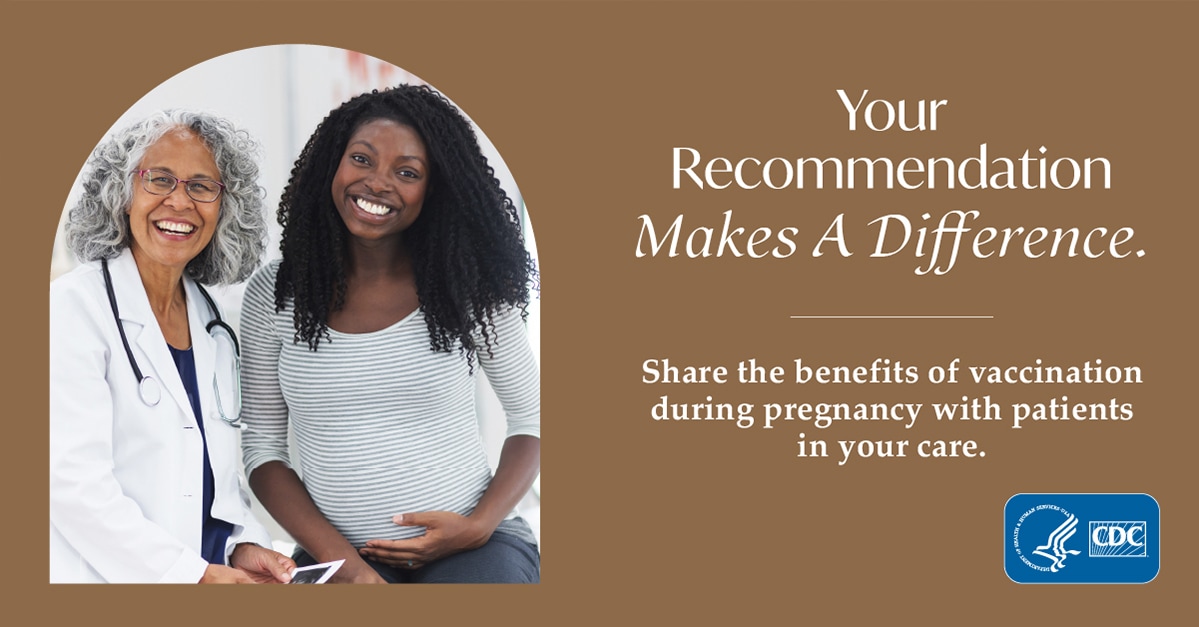At a glance
- Recommended vaccines provide important protection against severe illness for pregnant people and their infants in the first few months of life.1-4
- Overall prenatal vaccination coverage estimates remain low, leaving many pregnant people and infants subject to poor health outcomes.1-4
- Many Black pregnant people have historic, personal, and secondary health care experiences that include mistreatment and discrimination,5-7 which may influence vaccination behaviors.
- CDC's From Me, To You communications effort features tailored resources in both English and Spanish to support Black pregnant people as they make their vaccination decisions.
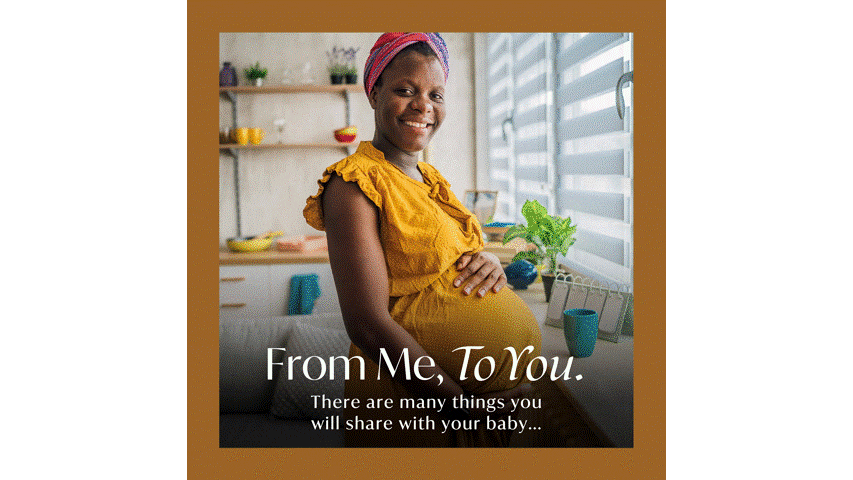
Overview
From Me, To You is a culturally responsive communications effort from CDC designed to reach Black pregnant people, Black people who may choose to become pregnant, and healthcare providers to encourage conversations about vaccination during pregnancy. The From Me, To You communications effort is informed by feedback from Black pregnant people, intentionally centering on the beauty, excitement, and rich cultural legacy of Black parenthood.
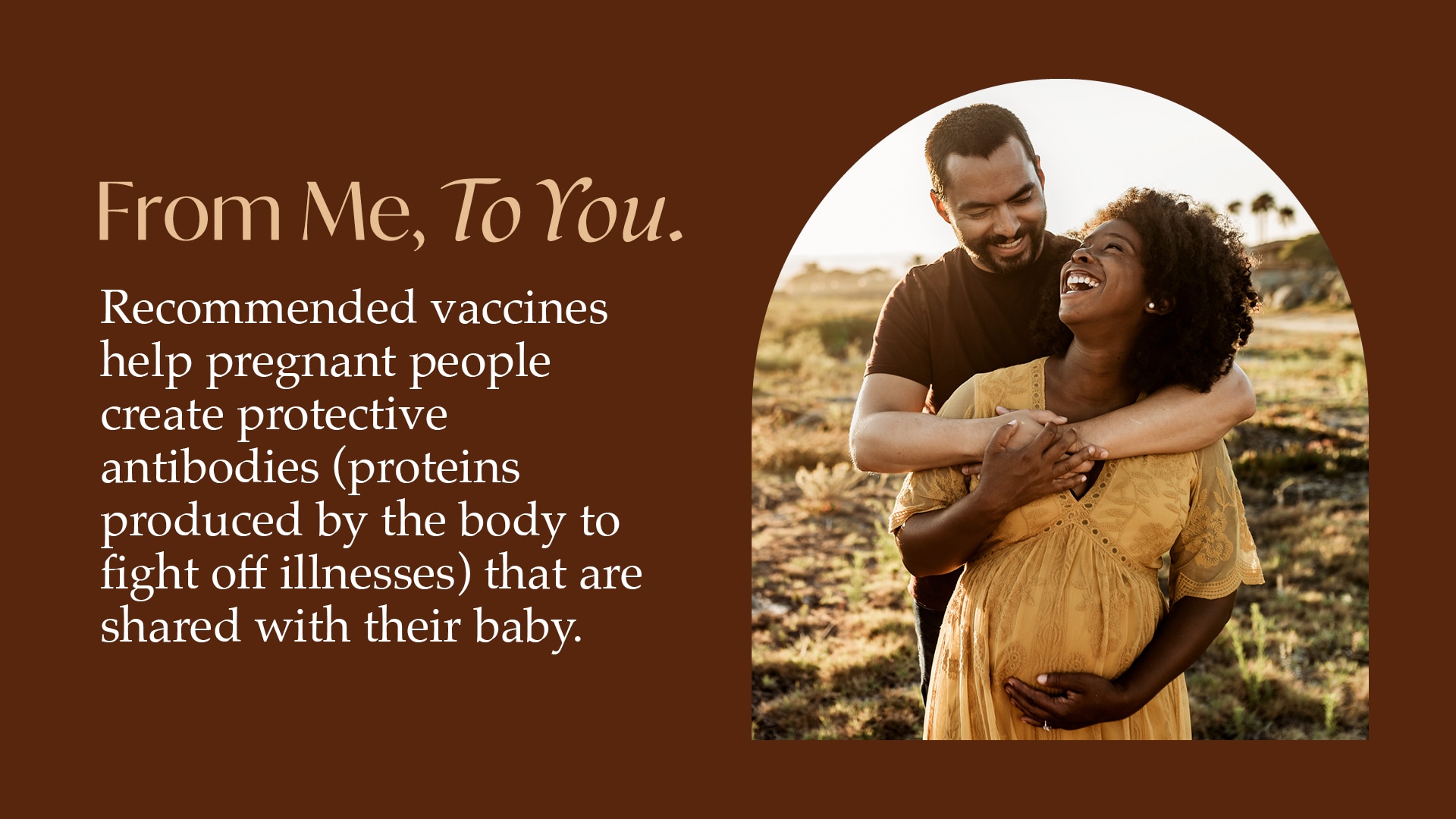
Why it's needed
- Vaccination coverage is often lowest among Black pregnant people compared to pregnant people in other observed racial and ethnic groups.1-4
- While a provider recommendation is one of the strongest known predictors of vaccination uptake, Black pregnant people may be less likely to receive a vaccination offer or referral from their healthcare provider than pregnant people from other racial and ethnic groups. 8-12
- Historical and present-day experiences of mistreatment and discrimination during maternity care 5,7 may impact vaccination coverage among Black pregnant people.
Goals
The goals of From Me, To You are to:
- Raise awareness of the importance of receiving recommended vaccinations during pregnancy.
- Increase knowledge about how vaccination helps a pregnant person share protection with their baby.
- Equip trusted voices with additional resources to support pregnant people as they make their vaccination decisions.
- Support prenatal care providers as they recommend and offer appropriate vaccinations during pregnancy.

Key Messages
Key messages of From Me, To You include:
- Getting recommended vaccinations while you're pregnant helps your body create protective antibodies (proteins produced by the body to fight off illnesses) that are shared with your baby.
- Antibodies from pregnant people can help protect babies from several illnesses during their first few months of life.
- A healthcare provider's recommendation for vaccination during pregnancy is one of the strongest known predictors of vaccination uptake.
- All recommended vaccines are held to the highest standards of safety – meaning they are carefully studied and monitored for side effects.
Partners
We invite you to join us in encouraging:
- Black pregnant people to discuss prenatal vaccination with healthcare providers they trust.
- Healthcare providers to recommend and offer appropriate vaccinations to pregnant patients in their care.
Share From Me, To You communications materials on your websites, in newsletters, and through social media channels.
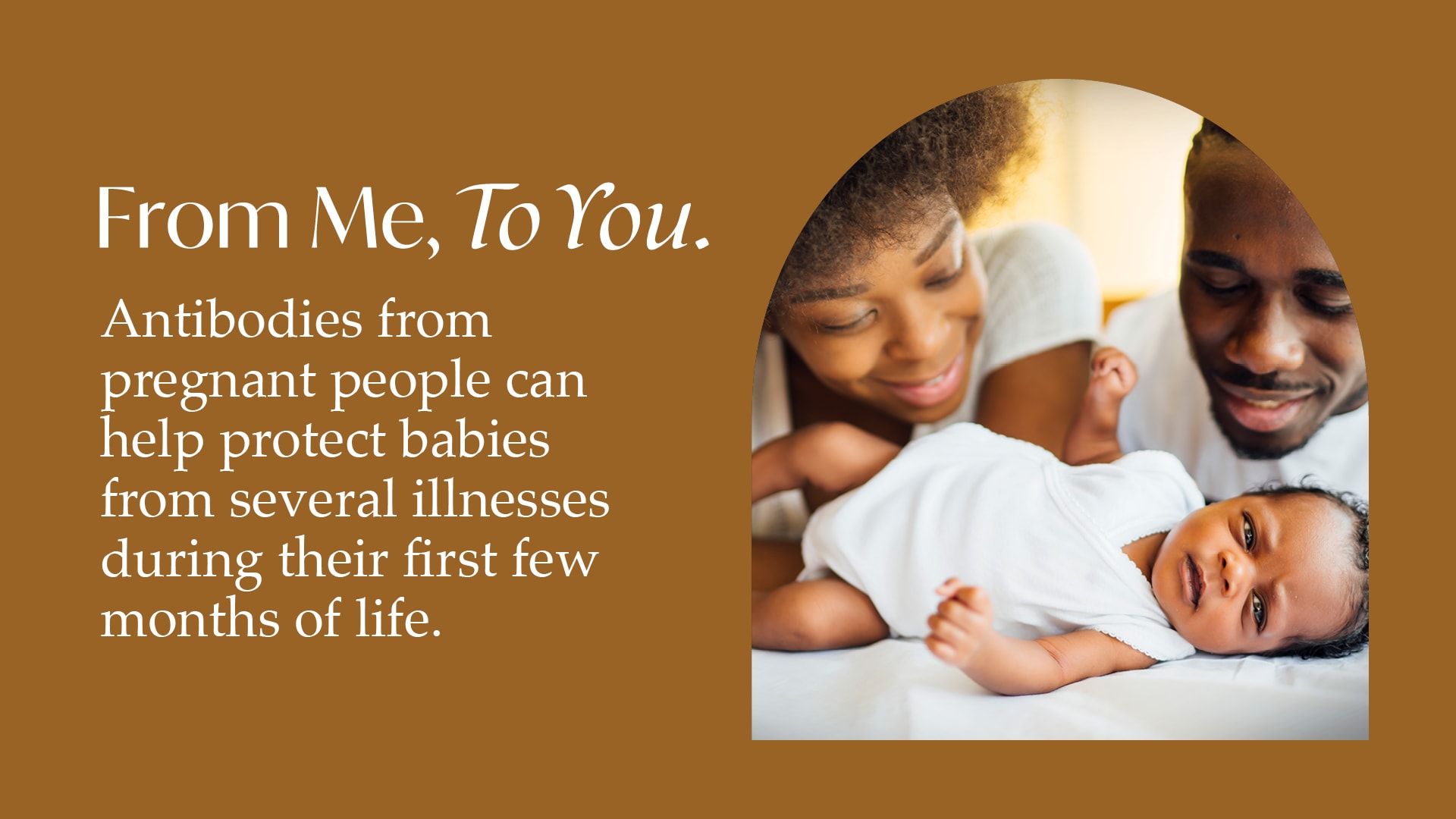
Resources

From Me, To You includes tested resources in both English and Spanish to support Black pregnant people as they make their vaccination decisions. Shareable graphics and social media content, current vaccination recommendations, fact sheets, posters, a provider toolkit, safety data, information on possible vaccine side effects, and answers to commonly asked vaccination questions are now available.
Interested in individual files? See all From Me, To You resources.
Want to view files by category? Download zip files.
For detailed information about vaccines and pregnancy, visit:
For information and resources about specific vaccines, visit:
To learn more about vaccine safety and possible side effects, visit:
For additional patient education resources and vaccine coverage data, visit:
- [1] Razzaghi H, Kahn KE, Calhoun K, et al. Influenza, Tdap, and COVID-19 Vaccination Coverage and Hesitancy Among Pregnant Women - United States, April 2023. MMWR Morb Mortal Wkly Rep. 2023;72(39):1065-1071. Published 2023 Sep 29. doi:10.15585/mmwr.mm7239a4
- [2] Respiratory Syncytial Virus (RSV) Vaccination Coverage, Pregnant Persons, United States. Centers for Disease Control and Prevention. Updated March 6, 2024. Accessed July 25, 2024. https://www.cdc.gov/vaccines/imz-managers/coverage/rsvvaxview/pregnant-persons-coverage-intent.html
- [3] Influenza Vaccination Coverage, Pregnant Persons, United States. Centers for Disease Control and Prevention. Updated April 26, 2024. Accessed July 25, 2024. https://www.cdc.gov/flu/fluvaxview/dashboard/vaccination-coverage-pregnant.html
- [4] Pregnant Persons Coverage. Centers for Disease Control and Prevention. Accessed July 25, 2024. https://www.cdc.gov/vaccines/imz-managers/coverage/covidvaxview/interactive/pregnant-coverage-vaccination.html
- [5] Mohamoud YA, Cassidy E, Fuchs E, et al. Vital Signs: Maternity Care Experiences - United States, April 2023. MMWR Morb Mortal Wkly Rep. 2023;72(35):961-967. Published 2023 Sep 1. doi:10.15585/mmwr.mm7235e1
- [6] Treder K, White KO, Woodhams E, Pancholi R, Yinusa-Nyahkoon L. Racism and the Reproductive Health Experiences of U.S.-Born Black Women. Obstet Gynecol. 2022;139(3):407-416. doi:10.1097/AOG.0000000000004675
- [7] Avorgbedor F, Gondwe KW, Aljarrah A, Bankole AO. COVID-19 Vaccine Decision-Making Among Black Pregnant and Postpartum Women. J Racial Ethn Health Disparities. Published online June 19, 2023. doi:10.1007/s40615-023-01675-6
- [8] Kortsmit K, Oduyebo T, Simeone RM, et al. Influenza and tetanus, diphtheria, and acellular pertussis vaccination coverage during pregnancy: Pregnancy Risk Assessment Monitoring System, 2020. Public Health Rep2023;00333549231179252. http://doi.org/10.1177/00333549231179252
- [9] Kiefer MK, Mehl R, Costantine MM, et al. Association between social vulnerability and influenza and tetanus-diphtheria-acellular pertussis vaccination in pregnant and postpartum individuals. Am J Obstet Gynecol MFM. 2022;4(3):100603. doi:10.1016/j.ajogmf.2022.100603
- [10] Spires B, Brewton A, Maples JM, Ehrlich SF, Fortner KB. Vaccine Hesitancy in Women's Health. Obstet Gynecol Clin North Am. 2023;50(2):401-419. doi:10.1016/j.ogc.2023.02.013
- [11] Wales DP, Khan S, Suresh D, Ata A, Morris B. Factors associated with Tdap vaccination receipt during pregnancy: a cross-sectional study. Public Health. 2020;179:38-44. doi:10.1016/j.puhe.2019.10.001
- [12] Zimmerman M, Zapata LP, Bachiller K, et al. Comparison of attitudes toward routine maternal vaccines and COVID-19 vaccines among pregnant patients in an urban safety-net setting. J Natl Med Assoc. 2023;115(4):362-376. doi:10.1016/j.jnma.2023.04.003




